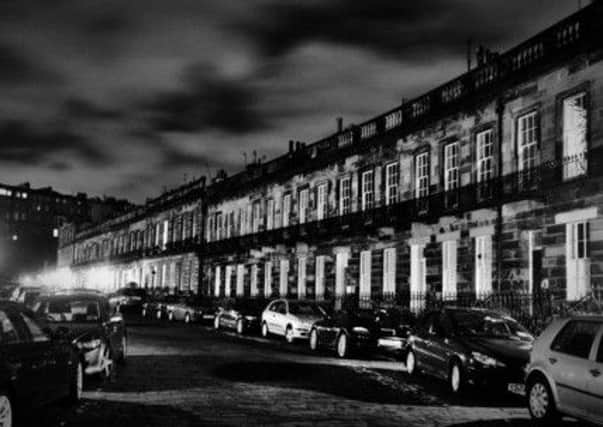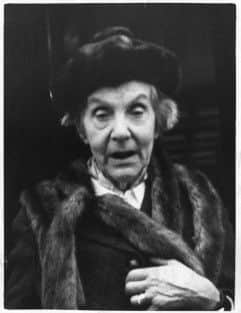Lost Edinburgh: 17 Danube Street
This article contains affiliate links. We may earn a small commission on items purchased through this article, but that does not affect our editorial judgement.


At one time 17 Danube Street, located on the northern fringes of the city’s genteel New Town, was the most notorious address in Edinburgh. For over 30 years the Georgian townhouse operated as a hugely successful brothel, run by the nation’s best-known madam: Dora Noyce.
Dora’s early years
Dora was born Georgie Hunter Rae in 1900. The daughter of a humble craftsman, she grew up on Rose Street in Edinburgh’s city centre, which at that time was one of the less salubrious nooks of the New Town. As Dora approached adulthood she began to work as a call girl and rather curiously adopted a refined ‘Morningside’ accent – presumably to draw in a higher class of clientèle.


Advertisement
Hide AdAdvertisement
Hide AdAt the age of 23, Dora gave birth to a daughter. It is around this time that she began to use the surname of her child’s father in place of her own. The inspiration for her adopted first name is thought to have stemmed from her early vice days.
It was not until shortly after the Second World War that Dora purchased the large townhouse on Danube Street. Dora had become a brothel-keeper in a city teeming with servicemen, and it wasn’t long before her clandestine business venture attracted a plethora of clients.
High demand
Word of Dora’s New Town knocking shop soon spread far beyond Stockbridge, and ‘visitor’ numbers soared – also helped in part by the sudden influx of tourism to the city following the first Edinburgh Festival in 1947. Local taxi drivers could hardly have had any complaints as they made a veritable fortune ferrying punters to and from the property at No.17.
Dora despised her home being labelled a brothel, preferring instead to describe it as ‘a house of leisure and pleasure’ or ‘a YMCA with extras’. Upon entering the establishment, customers could enjoy coffee, sandwiches and biscuits as they decided which girl took their fancy. The girls were well-looked after and underwent regular medical checks.
Dora employed up to 15 girls in permanent residence at any one time, though this could increase in line with demand – especially, according to Mrs Noyce, during the festival and the fortnight-long gathering of the General Assembly of the Church of Scotland, when up to an extra 25 girls would be called in from Glasgow.
One of the busiest days for Noyce and her girls occurred around 1970 when the aircraft carrier USS John F Kennedy was docked at Leith. Eyewitnesses reported that the queue of sailors snaked right round the block to neighbouring Ann Street and beyond. More than £4,000 reportedly changed hands before the ship’s captain caught wind of what his men were up to and put an abrupt end to it.
“Make sure you print the correct address”
Despite the seedy nature of the business she was profiting from, Madam Noyce appeared to emit an air of respectability which was relatively uncommon in her industry. She would often dress in furs, twinset and pearls to fit in with the archetypal well-to-do Edinburgh ladies of her time, and was considered ‘very clean and presentable’ by those who knew her personally.
She also possessed a razor-sharp wit with a wonderful habit of demonstrating it when interviewed by journalists - such as the time she famously quipped: “In my profession there is no such thing as bad publicity, so do make sure you print the correct address in your newspaper.”
Trouble with the law
Advertisement
Hide AdAdvertisement
Hide AdThe much-publicised activities which took place at Danube Street were, of course, illegal. Dora Noyce was the city’s oldest madam, in the world’s most ancient profession, but this did not spare her from the letter of the law. Noyce was charged 47 times for living off of immoral earnings, and occasionally paid hefty fines of up to £250 for the pleasure.
Despite the odd run-in, Dora enjoyed a mostly civil relationship with the police. Raids were kept to a minimum as long as she agreed to help out occasionally as an informer.
The biggest threats to the brothel’s future came from Danube Street itself, a wealthy enclave where property prices were spiralling downwards as a result of its increasingly sleazy reputation. Since little was being done about to curb the brothel, appalled residents demanded that their rates be cut. The council reluctantly agreed - which put pressure on the authorities to act.
In 1972, an elderly Dora was jailed for the final time, spending 4 months in prison. Ironically, local councillors commented that they received a noticeable increase in complaints from neighbours while she was gone because her business was less well-managed. Dora was incensed by her incarceration and upon her release she proclaimed: “It was very stupid of the court. I was just a burden on the ratepayers and goodness knows they have enough to put up with already.”
Dora’s death and legacy
Dora Noyce passed away in 1977 at the age of 76. The business continued for a short period after her death, but was soon closed down and the property split into separate flats.
As a fitting tribute to the incredible success of Dora Noyce’s infamous brothel, hopeful punters continue to visit the address to this day. It is said that the odd unexpected gentleman visitor (the subject of a prank-fuelled erroneous tip-off from an older relative perhaps?) still knocks at the door from time to time only to return feeling bitterly unfulfilled and disappointed - albeit with enough spare cash to grab a taxi home.
• Visit Lost Edinburgh on their Facebook page, and follow them on Twitter @lostedinburgh